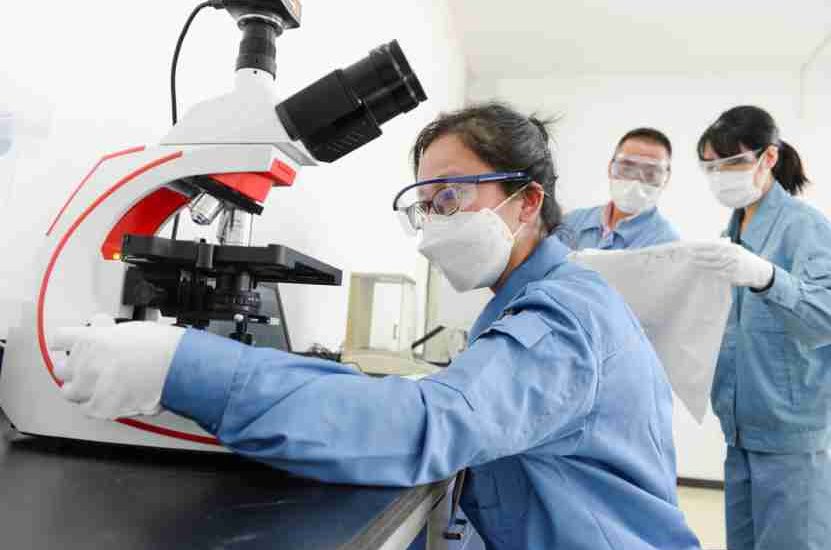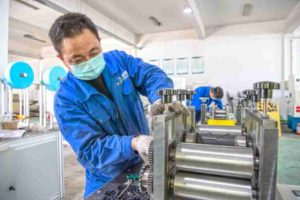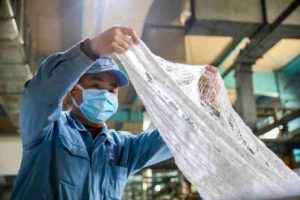
China’s mask production amid COVID-19 indicates strong manufacturing capability
By Lu Ya’nan, Wang Zheng, Li Xinping (People’s Daily) 10:21, May 24, 2020
In just 35 days, China’s daily output of masks surged 13.5 times from 8 million pieces on Jan. 25 to 116 million on Feb. 29.
China exported 3.86 billion pieces of masks between March 1 and April 4, and the figure expanded to 23.94 billion in the next 26 days. In just two months, a total of 27.8 billion pieces of masks were shipped from China to overseas destinations, approximately 3 times more than those exported throughout the last year.
These figures indicate the powerful manufacturing capability of China. The country has sufficient space of production, a complete quality control system, vast highly-educated human resource, and a strong R&D and production system, which served as a solid foundation for the country to produce so many masks.
In an industrial park of Chinese carmaker BYD in Longgang district, Shenzhen, 100 mask production lines are rolling in high speed in a place of around 36 standard basketball courts, where blue and white non-woven fabrics are made into a piece of disposable medical mask in just 0.6 second after a series of processing.
These production lines are built in what was previously a dust-free workshop of BYD for mobile phone parts production. Now the workshop has been turned into a major facility of the world’s largest mask manufacturer.
Apart from BYD, many other Chinese manufacturers including automobile producer GAC Group, joint venture carmaker SAIC-GM-Wuling, home appliance giant Gree Electric and garment producer Youngor have all become the pillars supporting China’s mask production.
“The rapid transition of so many enterprises, which were not in the industry before, indicated the strong manufacturing capability of China,” said Zeng Qinghong, chairman of board of the GAC Group. The rich experiences of the Chinese manufacturing industry in technology, management, quality control and supply chain management, as well as its sufficient talent reserve and broad factories have all laid a solid foundation for mask production, he added.
Fan Weijian, an engineer from the GAC Group shared his personal experiences in the industrial transition. When he and his colleagues assembled the first mask production machine, the welding technology of masks’ ear bands unexpectedly became a major challenge, which even halted the whole production line, as the welding head was always sticking to the masks.
 There was no one offering guidance, but they explored a way out from their own experiences. They established a special work group to tackle the problem, and made experiments on a high-precision digit-controlled machine tool. After four days of arduous efforts, they found the perfect solution and made a breakthrough.
There was no one offering guidance, but they explored a way out from their own experiences. They established a special work group to tackle the problem, and made experiments on a high-precision digit-controlled machine tool. After four days of arduous efforts, they found the perfect solution and made a breakthrough.
China’s industrial chains are closely interconnected, and the country has a complete production system. That is a consensus reached by many enterprises who shifted their production to masks to respond to the epidemic.
The masks are small, but their production needs joint efforts from a complicated industrial chain covering chemicals, textile, materials, machinery, metallurgy, electronics and other basic industries. It also calls for techniques such as material processing, machinery manufacturing, electronic management and ultrasonic welding. It would have been impossible to manufacture the products if any link on this chain failed.
Boasting 41 industrial divisions, 207 groups and 666 classes of products and services, China has developed an independent and complete modern industrial system. It is the only country in the world that ticks all the industrial category boxes under the United Nations’ industrial classification standard.
All the materials for masks and spare parts for mask machines could be produced and purchased in a short time in China when global logistics were troubled by the epidemic.
The complete system not only laid a solid foundation for the expansion of mask production, but also made huge contribution to the global fight against the epidemic. So far, China has offered medical and material aid to 127 countries and 4 international organizations.
“Orders placed now are scheduled to be shipped in October, and we have exported our products to many countries,” said Jiao Na, vice general manager of the overseas sales department of San Qi Medical based in Rizhao, east China’s Shandong province. According to her, the lights of the workshops have not been turned off since late January this year, and the factory has produced a total of 300 million pieces of masks.
 San Qi Medical was not fighting alone against the epidemic. In order to help the company restore and expand production, the municipal government of Rizhao established a special work group stationed at the enterprise, together with two special officials dispatched by relevant departments, to offer assistance and smooth the industrial chain. The daily output of the company soon climbed to 3.5 million pieces, five- to six-fold than usual. Government departments at all levels and all industries across the country have participated in the battle against the epidemic at the first opportunity to ensure mask production. “Our country has the institutional advantages to concentrate resources to accomplish large undertakings, and that’s why we made such achievements,” said Sun Zhicheng, member of the material supply group of the CPC Central Committee leading group for the epidemic response work, and deputy director-general of the Social Development Bureau, National Development and Reform Commission.
San Qi Medical was not fighting alone against the epidemic. In order to help the company restore and expand production, the municipal government of Rizhao established a special work group stationed at the enterprise, together with two special officials dispatched by relevant departments, to offer assistance and smooth the industrial chain. The daily output of the company soon climbed to 3.5 million pieces, five- to six-fold than usual. Government departments at all levels and all industries across the country have participated in the battle against the epidemic at the first opportunity to ensure mask production. “Our country has the institutional advantages to concentrate resources to accomplish large undertakings, and that’s why we made such achievements,” said Sun Zhicheng, member of the material supply group of the CPC Central Committee leading group for the epidemic response work, and deputy director-general of the Social Development Bureau, National Development and Reform Commission.


 There was no one offering guidance, but they explored a way out from their own experiences. They established a special work group to tackle the problem, and made experiments on a high-precision digit-controlled machine tool. After four days of arduous efforts, they found the perfect solution and made a breakthrough.
There was no one offering guidance, but they explored a way out from their own experiences. They established a special work group to tackle the problem, and made experiments on a high-precision digit-controlled machine tool. After four days of arduous efforts, they found the perfect solution and made a breakthrough. San Qi Medical was not fighting alone against the epidemic. In order to help the company restore and expand production, the municipal government of Rizhao established a special work group stationed at the enterprise, together with two special officials dispatched by relevant departments, to offer assistance and smooth the industrial chain. The daily output of the company soon climbed to 3.5 million pieces, five- to six-fold than usual. Government departments at all levels and all industries across the country have participated in the battle against the epidemic at the first opportunity to ensure mask production. “Our country has the institutional advantages to concentrate resources to accomplish large undertakings, and that’s why we made such achievements,” said Sun Zhicheng, member of the material supply group of the CPC Central Committee leading group for the epidemic response work, and deputy director-general of the Social Development Bureau, National Development and Reform Commission.
San Qi Medical was not fighting alone against the epidemic. In order to help the company restore and expand production, the municipal government of Rizhao established a special work group stationed at the enterprise, together with two special officials dispatched by relevant departments, to offer assistance and smooth the industrial chain. The daily output of the company soon climbed to 3.5 million pieces, five- to six-fold than usual. Government departments at all levels and all industries across the country have participated in the battle against the epidemic at the first opportunity to ensure mask production. “Our country has the institutional advantages to concentrate resources to accomplish large undertakings, and that’s why we made such achievements,” said Sun Zhicheng, member of the material supply group of the CPC Central Committee leading group for the epidemic response work, and deputy director-general of the Social Development Bureau, National Development and Reform Commission.